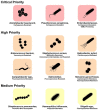Molecular Mechanisms of Antibiotic Resistance and Novel Treatment Strategies for Helicobacter pylori Infections
- PMID: 36977164
- PMCID: PMC10057134
- DOI: 10.3390/tropicalmed8030163
Molecular Mechanisms of Antibiotic Resistance and Novel Treatment Strategies for Helicobacter pylori Infections
Erratum in
-
Correction: Srisuphanunt et al. Molecular Mechanisms of Antibiotic Resistance and Novel Treatment Strategies for Helicobacter pylori Infections. Trop. Med. Infect. Dis. 2023, 8, 163.Trop Med Infect Dis. 2023 Aug 29;8(9):429. doi: 10.3390/tropicalmed8090429. Trop Med Infect Dis. 2023. PMID: 37755917 Free PMC article.
Abstract
Helicobacter pylori infects approximately 50% of the world's population and is considered the major etiological agent of severe gastric diseases, such as peptic ulcers and gastric carcinoma. Increasing resistance to standard antibiotics has now led to an ever-decreasing efficacy of eradication therapies and the development of novel and improved regimens for treatment is urgently required. Substantial progress has been made over the past few years in the identification of molecular mechanisms which are conducive to resistant phenotypes as well as for efficient strategies to counteract strain resistance and to avoid the use of ineffective antibiotics. These involve molecular testing methods, improved salvage therapies, and the discovery of novel and potent antimicrobial compounds. High rates of prevalence and gastric cancer are currently observed in Asian countries, including Japan, China, Korea, and Taiwan, where concomitantly intensive research efforts were initiated to explore advanced eradication regimens aimed at reducing the risk of gastric cancer. In this review, we present an overview of the known molecular mechanisms of antibiotic resistance and discuss recent intervention strategies for H. pylori diseases, with a view of the research progress in Asian countries.
Keywords: Helicobacter pylori; antibiotic resistance; drug development; salvage therapy.
Conflict of interest statement
The authors declare no conflict of interest.
Figures


References
-
- Hooi J.K.Y., Lai W.Y., Ng W.K., Suen M.M.Y., Underwood F.E., Tanyingoh D., Malfertheiner P., Graham D.Y., Wong V.W.S., Wu J.C.Y., et al. Global prevalence of Helicobacter pylori infection: Systematic review and meta-analysis. Gastroenterology. 2017;153:420–429. doi: 10.1053/j.gastro.2017.04.022. - DOI - PubMed
Publication types
Grants and funding
LinkOut - more resources
Full Text Sources
Miscellaneous

